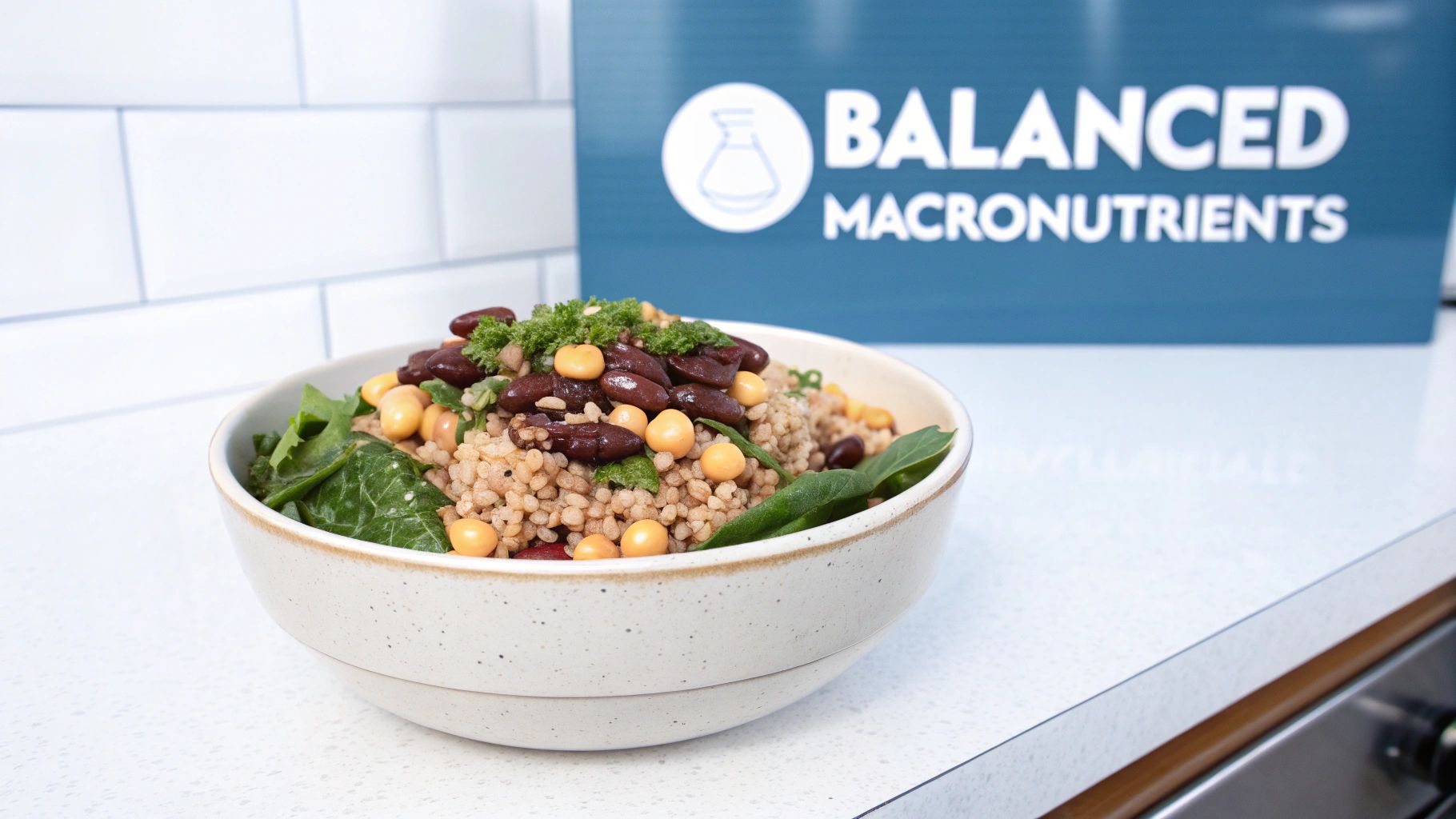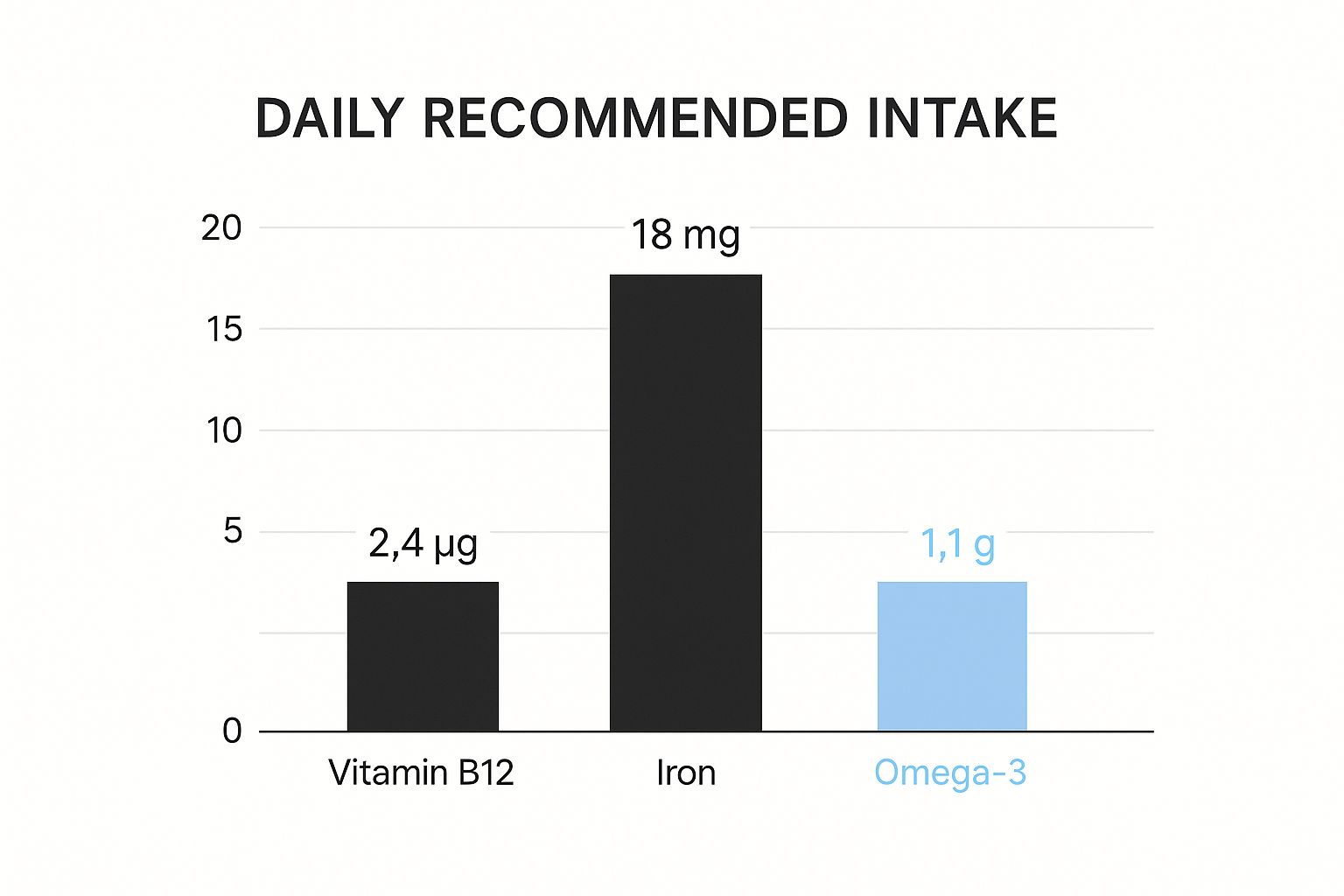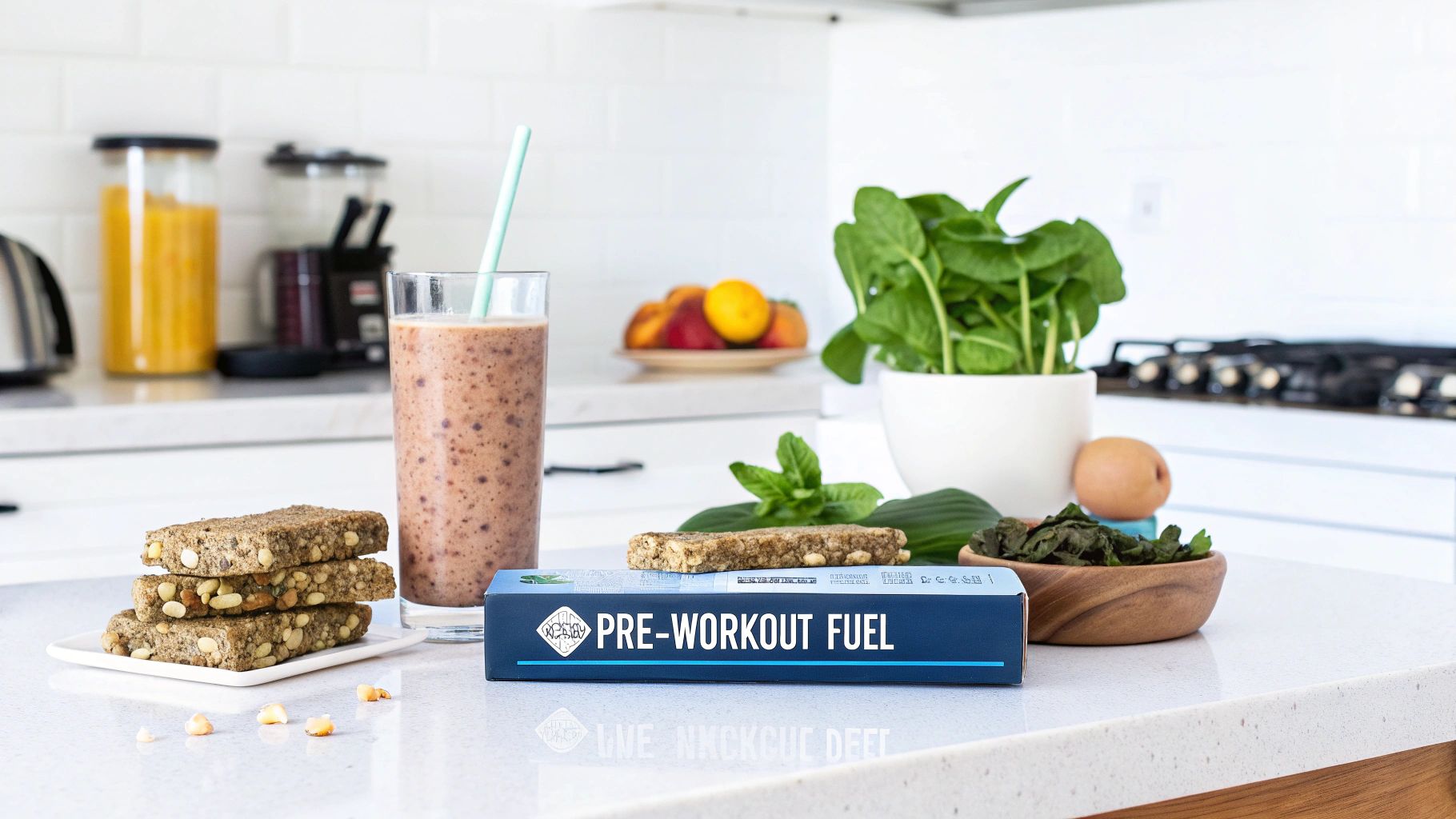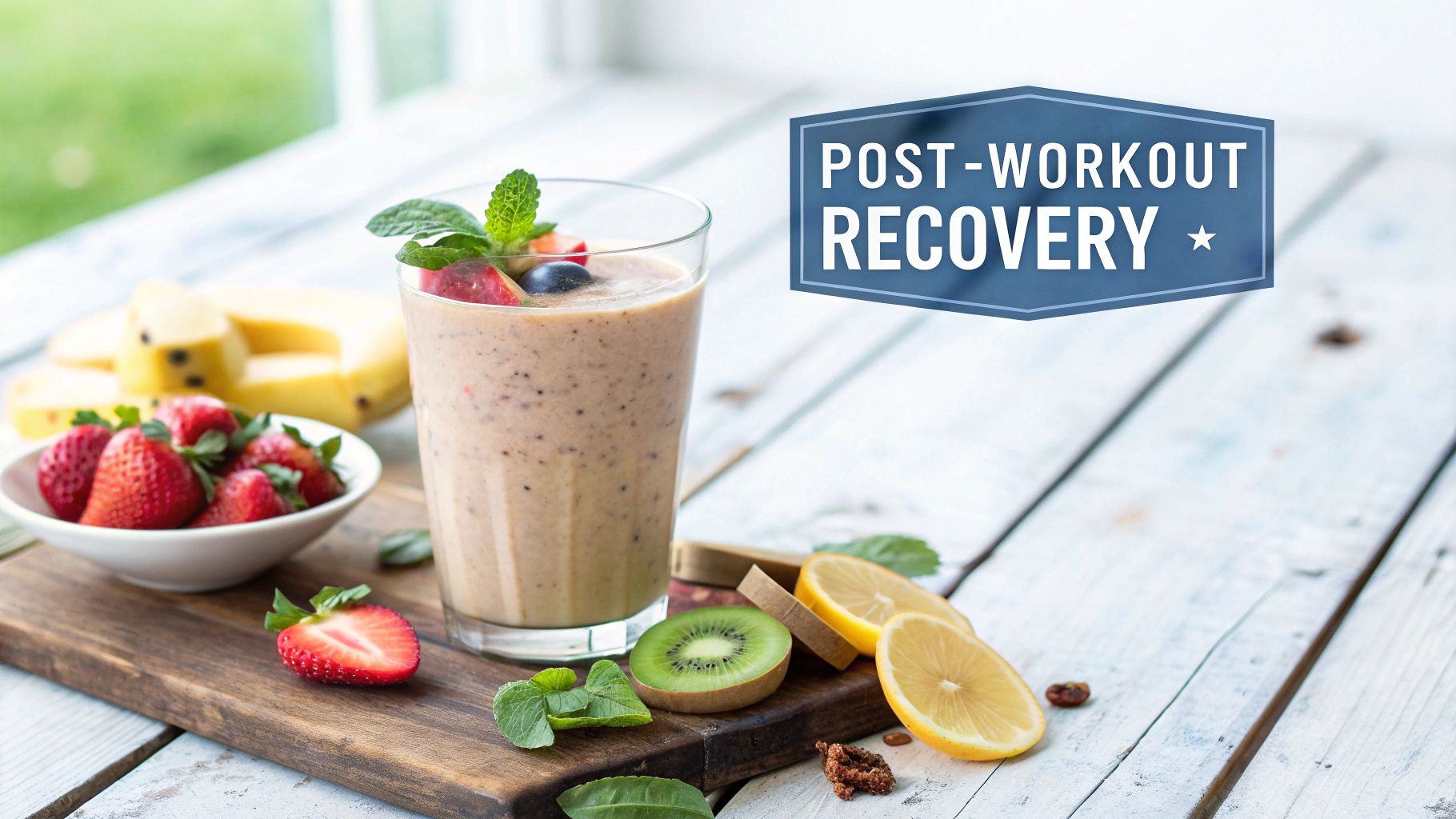Why Elite Athletes Are Choosing Plant-Based Nutrition
The world of sports nutrition is constantly changing. One significant shift is the growing number of elite athletes adopting plant-based diets. This isn't just a passing trend; it's a fundamental change in how athletes fuel their bodies for optimal performance. What's behind this shift, beyond the ethical and environmental reasons often linked to veganism?
One key factor is the increasing evidence of the performance benefits of plant-based nutrition for athletes. Athletes are finding that a well-planned plant-based diet provides all the necessary nutrients for muscle growth, increased endurance, and faster recovery. For instance, plant-based diets are naturally high in antioxidants, which help fight the oxidative stress from intense training. This allows athletes to recover quicker between workouts and stay at peak performance.
Plant-based diets also often lead to better cardiovascular health, essential for any athlete. Focusing on whole, unprocessed plant foods can lower cholesterol and improve blood flow, enhancing oxygen delivery to muscles. This results in greater stamina and better overall performance.
The rise of prominent vegan athletes achieving incredible results has contributed to this trend. Athletes like Kendrick Farris, an Olympic weightlifter, and Patrik Baboumian, a strongman and former bodybuilder, are prime examples. Documentaries like From the Ground Up and The Game Changers, released between 2017 and 2018, further boosted the visibility of successful plant-based athletes. Explore this topic further These stories prove that plant-based nutrition can not only support but enhance athletic performance at the highest level.
Beyond the Hype: Real Benefits for Serious Competitors
The shift towards plant-based eating in sports isn't about following a fad. It's about seeing real performance gains. Athletes are experiencing benefits such as:
-
Reduced Inflammation: Plant-based diets are packed with anti-inflammatory compounds, helping manage pain and speed up healing after injuries.
-
Sustained Energy: Complex carbohydrates in whole plant foods provide a steady release of energy, avoiding the energy crashes often linked to sugary sports drinks and processed foods.
-
Improved Gut Health: A healthy gut is vital for nutrient absorption and overall wellness. Fiber-rich plant-based diets promote a diverse and healthy gut microbiome.
Plant-Based Power: Examples in Action
The success of vegan athletes across various disciplines, from ultra-endurance runners to world-class weightlifters, demonstrates the effectiveness of plant-based nutrition. These athletes are breaking down stereotypes and showing the true potential of plant-powered performance. This shift makes it clear that plant-based diets for athletes are no longer a niche idea but a practical and popular choice for those looking to maximize their potential.
Plant-based nutrition offers a compelling mix of performance benefits and long-term health advantages, making it a wise choice for any serious athlete. It’s a shift that’s changing the game, one plant-powered performance at a time.
Getting Your Nutritional Foundation Right

Successfully transitioning to a vegan diet as an athlete isn't about restriction. It's about making smart food choices that fuel your body for peak performance. This means understanding the key nutrients vital for athletic success and how to get them from plants.
Essential Nutrients for Vegan Athletes
Building a solid nutritional foundation starts with prioritizing the right nutrients. One of the biggest questions surrounding vegan athletes is protein intake. This macronutrient is essential for muscle repair and growth, making it a cornerstone of any athlete's diet.
Getting enough iron and creatine is also vital. Iron helps carry oxygen throughout your body, while creatine supports muscle function and power output. Switching to a vegan diet might initially decrease protein intake if not planned carefully, especially for strength athletes.
However, this is easily overcome. By strategically combining plant-based protein sources, you can create complete proteins with optimal amino acid profiles. This supports muscle development and recovery. For example, combining legumes with grains provides all the essential amino acids your body requires. Learn more about maximizing muscle growth with a plant-based diet. Read also: Vegan Bodybuilding Meal Plan: Maximize Muscle Growth Ensuring enough protein, iron, and creatine is a key nutritional consideration for vegan athletes. Explore this topic further.
Beyond macronutrients, micronutrients are equally important. B vitamins, especially B12, are crucial for energy production and nerve function. Because B12 is primarily found in animal products, vegan athletes need to include fortified foods or supplements. Getting adequate vitamin D, zinc, and omega-3 fatty acids is also important for overall health and athletic performance.
Meal Timing for Maximum Benefit
Strategically timing your meals can significantly impact how your body uses nutrients. This includes pre- and post-workout nutrition and optimizing nutrient absorption. Eating a carbohydrate-rich meal a few hours before training provides sustained energy.
A protein-rich snack post-workout helps with muscle recovery. Combining certain foods can also enhance nutrient absorption. Pairing iron-rich foods with vitamin C-rich sources, for instance, boosts iron uptake.
Supplements: Separating Fact from Fiction
A well-planned vegan diet can provide all the essential nutrients. However, some athletes might find supplements beneficial. It’s important to understand the difference between genuine need and marketing hype.
Working with a qualified sports nutritionist who understands plant-based diets can be helpful. They can determine which supplements, if any, are right for your individual needs and training goals. This personalized approach prevents wasted money on unnecessary supplements and ensures targeted support. This informed approach allows athletes to build a robust nutritional foundation, supporting immediate performance and long-term health.
Mastering Plant-Based Protein For Serious Athletes
Forget the outdated notion that plant-based protein isn't enough for serious training. We're diving deep into the strategies vegan bodybuilders and strength athletes use to build impressive muscle using only plants. This involves understanding amino acid profiles, protein timing, and strategic food combinations to surpass protein requirements without animal products.
The Power of Plant-Based Protein
Many assume plant proteins are "incomplete," lacking essential amino acids. While individual plant sources might not contain all nine essential amino acids, combining them easily solves this. Think of it like building with LEGOs: different bricks (plant proteins) combine to create a complete structure (a complete protein). Pairing grains like rice or quinoa with legumes like lentils or beans creates a complete protein source.
Additionally, emerging protein sources like hemp protein offer a complete amino acid profile naturally. These are excellent options for athletes seeking convenient, high-quality plant protein. You might be interested in: The Importance of Leucine in Protein Powders.
Timing and Bioavailability
Just as important as what you eat is when you eat it. Protein timing plays a critical role in muscle protein synthesis. Consuming protein before and after workouts maximizes muscle repair and growth. A pre-workout smoothie with hemp protein and fruit provides sustained energy, while a post-workout meal with lentils and rice promotes muscle recovery.
Furthermore, maximizing bioavailability—how readily your body absorbs nutrients—is crucial. Pairing iron-rich foods like spinach with Vitamin C-rich sources like bell peppers enhances iron absorption. Similarly, consuming plant proteins with healthy fats improves the absorption of fat-soluble vitamins important for athletic performance.
Micronutrients for Vegan Athletes

This infographic highlights the daily recommended intake of key micronutrients for vegan athletes. Specifically, Vitamin B12 at 2.4 μg, Iron at 18 mg, and Omega-3 at 1.1g. Ensuring adequate intake of these nutrients is vital, as deficiencies can hinder performance and overall health. Supplementation might be necessary to reach these levels, especially for B12, which isn’t readily available in plant foods.
The following table provides a comparison of various plant-based protein sources commonly used by vegan athletes. It examines protein content, amino acid profiles, digestibility, and recommended uses.
Plant-Based Protein Sources Comparison
| Protein Source | Protein per 100g | Complete Amino Profile | Digestibility Score | Best Uses |
|---|---|---|---|---|
| Lentils | 18g | No | 70-80 | Soups, stews, salads |
| Quinoa | 4.5g | Yes | 92 | Salads, bowls, side dishes |
| Tofu | 8g | No | 90-95 | Stir-fries, scrambles, smoothies |
| Hemp Seeds | 33g | Yes | 91-98 | Smoothies, yogurt, oatmeal |
| Chia Seeds | 17g | No | ~90 | Puddings, smoothies, baked goods |
| Brown Rice | 2.5g | No | ~80 | As a grain with legumes |
| Black Beans | 21g | No | 75-85 | Soups, burritos, salads |
As this table demonstrates, combining different plant-based protein sources can ensure a complete amino acid profile and optimize digestibility for better muscle protein synthesis.
Meal Prep and Practical Tips
Smart meal prep is essential for busy athletes. This ensures you're never short on quality protein sources when training demands are high. Batch cooking lentils, beans, and tofu provides a ready supply of protein for quick meals and snacks. Freezing pre-portioned smoothie ingredients streamlines morning nutrition, making it easy to get that crucial pre-workout protein boost.
Cost-effective protein doesn't mean sacrificing quality. Dried beans, lentils, and peas offer excellent protein per dollar. Combining these with whole grains like rice and oats creates affordable, nutrient-dense meals that support intensive training. This approach helps vegan athletes build muscle and achieve their performance goals without breaking the bank.
Strategic Carbohydrate Fueling For Peak Performance
Plant-based nutrition truly shines when it comes to carbohydrates, a vital element often underestimated by athletes. This section delves deeper than simple carb loading, exploring how to effectively use the complex carbohydrates found in plant-based foods for sustained energy and quicker recovery. It's not just about eating more carbs; it's about strategic choices and timing for a competitive advantage.
Optimizing Glycogen Storage and Fiber Management
Glycogen, stored in your muscles and liver, is your body's main fuel source during physical activity. Plant-based diets, rich in complex carbohydrates, are perfect for maximizing these glycogen stores. Timing plays a critical role: consuming carbohydrates a few hours before your workout ensures your energy reserves are topped off.
Fiber, plentiful in plant-based foods, is essential for gut health. However, it can sometimes cause digestive issues if not managed effectively, especially during competition.
For instance, while beans and lentils offer excellent carbohydrate and protein, large portions right before exercise might lead to discomfort. This doesn't mean avoiding fiber altogether; it means adjusting your intake according to your individual tolerance and training schedule.
Carbohydrate Sources for Varying Training Intensities
Different training intensities call for different carbohydrate approaches. Low-intensity workouts can be fueled by lower-glycemic carbohydrates like sweet potatoes or quinoa, offering a steady release of energy.
On the other hand, high-intensity training requires quickly accessible carbohydrates, such as bananas or dates, to meet the rapid energy demands. This targeted method makes sure your body receives the appropriate fuel at the optimal time. Plant-based diets naturally deliver high-quality complex carbohydrates, providing sustained energy and enhanced recovery compared to the simple carbohydrates often found in processed foods. Discover more insights about carbohydrate performance.
Pre-Competition Fueling and Recovery Protocols
Pre-competition fueling goes beyond simply loading up on carbs. It's about choosing the right kind and the right amount for peak performance. A meal featuring easily digestible carbohydrates like rice or potatoes a few hours before competition provides readily available energy without digestive upset.
Post-workout and post-competition nutrition is crucial for recovery and adaptation. Consuming carbohydrates right after training helps replenish glycogen stores and jumpstarts muscle recovery. Smoothies with fruit and Cantein's organic hemp protein powder offer a practical and effective recovery solution, supplying both carbohydrates and protein for optimal results.
Maintaining Stable Blood Sugar
Maintaining stable blood sugar is essential for consistent energy and avoiding energy crashes. Plant-based foods, with their complex carbohydrates and fiber, help regulate blood sugar, preventing those mid-workout energy dips.
This is especially important during intense training periods where steady energy is key for progress. By prioritizing complex carbohydrates, vegan athletes can maintain stable blood sugar levels for optimal performance throughout their training.
Strategic carbohydrate fueling is all about optimizing your body's capacity to utilize its preferred fuel source efficiently. By understanding how different carbohydrates affect your body during various training intensities, and by implementing smart timing strategies, you can significantly enhance your athletic performance and recovery on a plant-based diet.
Avoiding Critical Nutrient Deficiencies That Kill Performance

A well-planned vegan diet offers numerous advantages for athletes. However, addressing potential nutrient deficiencies is paramount for maximizing performance and maintaining overall health. Ignoring these crucial nutrients can significantly impact an athlete's potential. This section explores the key nutrients requiring specific attention in vegan athlete nutrition, providing practical solutions for optimal intake.
Iron: Enhancing Absorption for Peak Performance
Iron is essential for oxygen transport and energy production, two cornerstones of athletic performance. Plant-based iron (non-heme iron) is not absorbed as efficiently as iron from animal sources (heme iron). This difference makes strategic planning essential for vegan athletes.
One effective strategy for boosting iron absorption is combining iron-rich foods with sources of vitamin C. For instance, a salad combining lentils (iron) and bell peppers (vitamin C) improves iron uptake. Cooking with cast iron cookware can also subtly increase the iron content of meals.
B12: Going Beyond Basic Supplementation
Vitamin B12 is primarily found in animal products, making supplementation a virtual necessity for vegan athletes. B12 plays a vital role in nerve function and red blood cell formation, both important for optimal athleticism.
Simply taking any B12 supplement isn't enough. Understanding the different forms of B12 and selecting one with high bioavailability is key. Regular blood tests are also recommended to monitor B12 levels and ensure adequate intake.
Vitamin D, Zinc, and Omega-3s: Maintaining Peak Athletic Function
Vitamin D contributes to bone health, immune function, and muscle strength, all crucial for athletes. While sunlight provides a natural source, various factors can influence vitamin D production. Supplementation might be necessary, especially in winter or for athletes training primarily indoors.
Zinc is essential for immune function, protein synthesis, and wound healing. Vegan athletes can obtain zinc from sources like legumes, nuts, and seeds. Soaking and sprouting these foods can further improve zinc absorption.
Omega-3 fatty acids, specifically EPA and DHA, play a vital role in reducing inflammation and promoting cardiovascular health. Vegan sources include algae-based supplements and flaxseed oil. However, the body's conversion of ALA (found in flaxseed) to EPA and DHA may be inefficient, leading some athletes to prefer algae-based supplements.
Testing and Food-First Approaches
Regular blood tests can identify nutrient deficiencies before they impact training. This proactive measure helps athletes address potential issues early. A qualified sports nutritionist can provide valuable guidance in interpreting these results and creating a personalized plan.
While supplements have their place, focusing on whole food sources remains paramount. For example, organic hemp protein powder from Cantein offers a complete protein source, aiding muscle recovery and growth. Centering your diet around nutrient-dense whole foods minimizes the need for excessive supplementation.
Practical Meal Planning Strategies
Smart meal planning ensures consistent nutrient intake, even with demanding training schedules. Consider these key strategies:
-
Focus on nutrient-dense foods: Incorporate a diverse range of fruits, vegetables, whole grains, legumes, nuts, and seeds.
-
Combine foods for optimal absorption: Pair iron-rich foods with vitamin C and plant proteins with healthy fats.
-
Prepare meals and snacks in advance: This preparation prevents nutrient gaps during busy periods.
By implementing these strategies, vegan athletes can optimize their micronutrient intake without over-relying on supplements. This approach emphasizes providing the body with the necessary fuel for peak performance and overall well-being. Athletes can confidently embrace the benefits of a vegan diet, knowing their nutritional needs are being met effectively.
Real Performance Data From Plant-Based Athletes

The increasing number of athletes adopting plant-based diets isn't just a trend; it's supported by real performance results. This section explores research comparing plant-based and omnivorous athletes in various sports, ranging from endurance running to strength training. We'll examine recovery times, strength development, and important long-term health markers, separating fact from fiction regarding vegan athlete nutrition.
Endurance Performance on a Plant-Based Diet
Studies on endurance athletes who follow plant-based diets reveal encouraging findings. Some research suggests that these athletes may experience better cardiovascular health and less inflammation. Both are vital for optimal endurance performance. This suggests athletes may be able to run further and recover more quickly. The abundance of complex carbohydrates in plant-based diets offers a sustained energy source ideal for long-distance events.
Statistics on vegan athletes reveal growing adoption rates across different sports. For example, it's estimated that at least 10% of distance runners follow vegan or vegetarian diets. This highlights the rising popularity of plant-based eating among endurance athletes. Find more detailed statistics here. This trend extends beyond endurance sports, with bodybuilders and weightlifters also embracing veganism, challenging conventional ideas about protein sources.
Strength and Power in Plant-Based Athletes
Building muscle on a plant-based diet is entirely possible, contrary to common misconceptions. Research shows that vegan athletes can build strength and muscle mass comparable to their omnivorous counterparts. The key is consuming sufficient protein from sources such as legumes, tofu, tempeh, and Cantein's organic hemp protein powder. Check out our guide on Hemp Protein for Athletes: How to Fuel Your Workouts. Proper meal timing and thoughtful nutrient combinations are crucial for maximizing protein synthesis and muscle recovery.
Recovery and Long-Term Health
Plant-based diets often promote quicker recovery due to their anti-inflammatory characteristics. Plant foods are rich in antioxidants, which help counteract oxidative stress from intense workouts. Faster recovery allows for more consistent training and ultimately, more significant performance improvements.
Beyond immediate performance, plant-based diets provide long-term health advantages. Research suggests a decreased risk of chronic diseases, such as heart disease, type 2 diabetes, and certain cancers, in individuals following plant-based diets. This means focusing on vegan athlete nutrition supports current training goals while investing in overall health and well-being for the future.
The following table presents statistical data on the performance of vegan athletes across various sports. It highlights the adoption rates of plant-based diets, key performance metrics, and commonly reported benefits.
| Sport Category | Percentage Vegan/Vegetarian | Performance Metrics | Common Benefits Reported |
|---|---|---|---|
| Endurance Running | 10%+ | Improved cardiovascular health, reduced inflammation, increased endurance | Faster recovery, sustained energy levels |
| Bodybuilding/Weightlifting | Increasing | Comparable muscle mass and strength gains to omnivorous athletes | Improved digestion, reduced inflammation |
| Team Sports (e.g., Soccer, Basketball) | Growing | Enhanced recovery, improved energy levels | Increased stamina, improved overall fitness |
As you can see, plant-based diets can be successfully implemented across various sports disciplines, leading to notable performance improvements and long-term health benefits.
Interpreting the Data for Your Sport
While the data presents general trends, individual needs differ. Factors such as your specific sport, training intensity, and individual metabolism all affect how you should interpret these results. Consulting a registered dietitian specializing in sports nutrition can be valuable for developing a personalized plan tailored to your needs and objectives. This personalized guidance ensures optimal nutrient intake to support both performance and long-term health.
Realistic Expectations During the Transition
Transitioning to a plant-based diet as an athlete requires time and thoughtful planning. Anticipate an adjustment period as your body adapts to the new dietary approach. Prioritize learning about appropriate nutrition, effective meal planning, and potential supplement requirements. A gradual transition tends to be more sustainable than a sudden shift, allowing your body and digestive system to acclimate smoothly. Patience and consistency are essential during this phase. With a well-considered strategy, you can utilize vegan athlete nutrition for sustained success.
Your Complete Implementation Strategy
Turning the theory of vegan athlete nutrition into practice involves creating a personalized system. This system should align with your training schedule and lifestyle. This section provides a step-by-step guide to meal planning, smart shopping, efficient meal prepping, and addressing common challenges. This implementation-focused approach helps athletes seamlessly adopt and maintain a vegan athlete nutrition plan for the long haul.
Meal Planning for Peak Performance
Building a successful vegan athlete meal plan involves understanding your individual needs. These needs depend on your training volume and intensity. For example, a marathon runner requires more carbohydrates than a powerlifter. However, both benefit from sufficient protein for muscle repair and growth.
A well-structured meal plan should consider the following:
-
Pre- and Post-Workout Nutrition: Consume easily digestible carbohydrates before workouts for sustained energy. After workouts, prioritize protein and carbohydrates to replenish glycogen stores and facilitate muscle recovery.
-
Balanced Macronutrient Ratios: Find the right balance of carbohydrates, protein, and fats to support your specific goals. This balance will vary based on your training phase (e.g., higher carbohydrates during periods of intense training).
-
Micronutrient Considerations: Ensure adequate intake of iron, B12, vitamin D, zinc, and omega-3s. Strategic food choices and supplementation, if necessary, are crucial here.
Budget-Friendly Shopping Without Compromising Quality
Eating a nutritious vegan diet doesn't have to break the bank. Prioritize cost-effective staple foods:
-
Dried Beans and Lentils: These offer a fantastic source of protein and fiber at a lower cost than processed vegan meat substitutes.
-
Whole Grains: Oats, brown rice, and quinoa provide complex carbohydrates and essential nutrients without the premium price tag.
-
Seasonal Produce: Buying fruits and vegetables in season delivers the best flavor and nutritional value. Frozen fruits and vegetables are also a great, budget-friendly way to enjoy nutrient-rich produce all year round.
Meal Prep: Saving Time During Busy Training Periods
Efficient meal prepping streamlines your nutrition and saves valuable time:
-
Batch Cooking: Cook large batches of grains, beans, and lentils over the weekend to incorporate into various meals throughout the week.
-
Pre-Portioning: Divide your meals and snacks into individual containers. This creates easy grab-and-go options for those busy training days.
-
Smoothie Prep: Freeze smoothie ingredients in individual bags for quick and easy breakfast or post-workout fuel.
Troubleshooting Common Challenges
Transitioning to a plant-based diet can present some challenges:
-
Social Situations: Plan ahead for dining out or social events where vegan options might be limited.
-
Travel and Competition: Pack portable, nutrient-dense snacks like trail mix, protein bars (such as those from Cantein), and dried fruit to stay nourished while on the go.
-
Addressing Cravings: Explore healthy, plant-based alternatives for your favorite non-vegan foods. Experiment with different spices and flavors to create delicious and fulfilling meals.
Sample Meal Plans and Portable Nutrition Solutions
Personalized meal plans offer a good starting point:
-
Endurance Athletes: Focus on complex carbohydrates with ample protein for muscle repair and electrolytes for proper hydration.
-
Strength Athletes: Prioritize protein intake for muscle development along with adequate carbohydrates for energy and healthy fats to support hormone production.
Portable nutrition is key for active individuals:
-
Protein Shakes: Cantein's organic hemp protein powder offers a convenient and complete protein source for post-workout recovery or as a quick meal replacement.
-
Energy Bars: Opt for bars made with whole food ingredients and minimal added sugar.
-
Fruit and Nut Butter: This simple pairing provides a portable source of carbohydrates, protein, and healthy fats.
By proactively addressing potential challenges and implementing practical systems, athletes can successfully adopt and maintain a vegan athletic diet. This optimized approach allows athletes to thrive on a plant-based diet, achieving peak performance and overall well-being. Fuel your performance and recovery with Cantein's organic hemp protein powder and other plant-based nutrition solutions.

